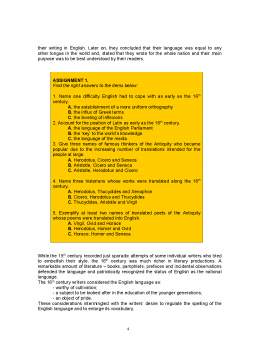Extras din curs
This final study session is intended to complete your knowledge about the evolution of the English language along the last half a millennium. This is the longest stage in the economics of the language history and it has witnessed inventions and innovations, historical, political, military and cultural events of paramount importance in the progress of humankind which inevitably have left their imprint on the English language.
By the end of this study you will be conversant with:
- The factors which further influenced the progress of the English language;
- Attitudes towards language which stood for a matter of national interest;
- Changes in the vocabulary and grammar of English before and after the 19th century;
- The cosmopolitan character of the 20th century English vocabulary.
22. Socio-historical Background.
The beginning of the Shakespearean English is conveniently placed at the beginning of the 16th century.
A chronology of the Shakespearean English major historical events
1475 - 1650 Renaissance loan words into English
1510 - 1514 Erasmus of Rotterdam teaches Greek at Cambridge
1516 Thomas More – Utopia – written in Latin
1535 English church abjures papal authority
1549 England declares war on France
1549 Book of Common Prayer written
1584 Roanoke settlement in America
1590 -1616 Shakespeare’s main works written
1604 Publication of Robert Cawdrey’s A Table Alphabeticall
1611 Authorized Version of the Bible
1712 Jonathan’s Swift’s proposal for an English Academy
1721 Publication of Nathaniel’s Bailey’s Universal Etymological English Dictionary
1755 Publication of Samuel Johnson’s Dictionary of the English Language
1762 Publication of Robert Lowth’s Short Introduction to English Language
1794 Publication of Lindley Murray’s English Grammar
1828 Publication of Noah Webster’s American Dictionary of the English Language
1884 - 1928 Publication of the Oxford English Dictionary
New factors, peculiar to this epoch influenced the development of the English language along lines which are different from those that had characterized its previous history. Among the new factors historian linguists usually include:
- the invention, adoption and the more and more extensive use of the printing press;
- the rapid spread of popular education;
- the increased communication and means of communication;
- the birth and growth of social consciousness.
Not all of the factors mentioned in the foregoing exercised the same degree of influence on the evolution of the English language.
The invention of the printing press and its having been introduced into the British culture had a first impact on manuscripts: they were more and more seldom seen and almost never sold. Instead, books were brought to the reach of all the people, ceasing, thus, to constitute the expensive luxury of very few people (as they were in Chaucer’s time). The possibility to reproduce a book in one thousand or one hundred thousand copies had an overwhelming consequence upon the life of the British society: it contributed to the rapid spread of popular education. The Paston Letters say that in the later Middle Ages a large number of the middle-class population could read and write. In Shakespeare’s London almost a third or probably half of the people could at least read.
Linguistically, the importance of the printing press lay in its having constituted a means to promote a standard or uniform language thought the territory in which it was understood.
The introduction in the printing press closely intermingled with the rapid development of education. In the 17th and 18th centuries a prosperous class of the tradesmen appeared and they not only had the means to obtain an education but also had the leisure to enjoy it. The concern for education was attested by (1) the great increase in the number of schools, (2) the tremendous journalistic output of an author like Defoe and by (3) the rapid rise of the novel stand as proof for the social interest in education. As a result of popular education the printing press was able to exert its influence upon language as upon thought.
Preview document
Conținut arhivă zip
- Shakespearean English.doc













































